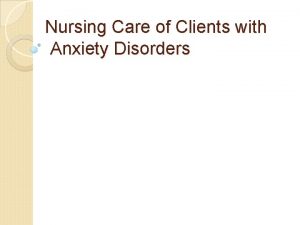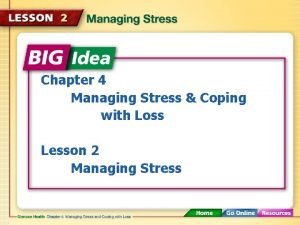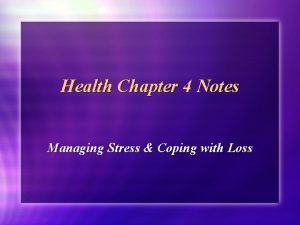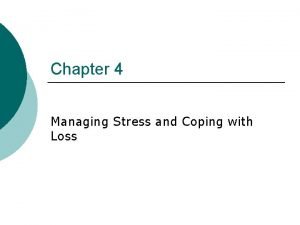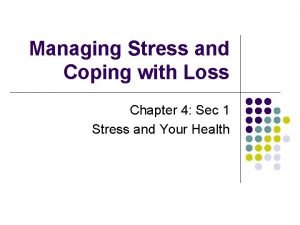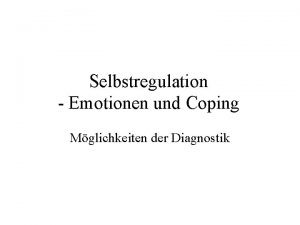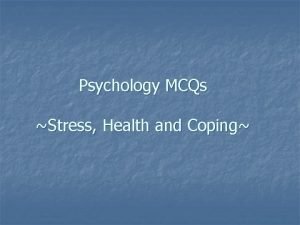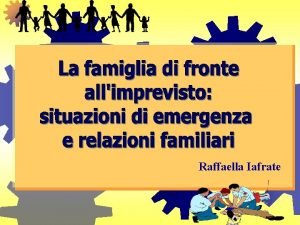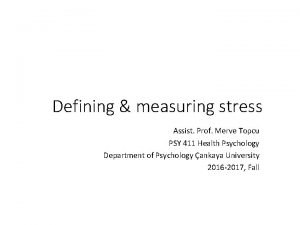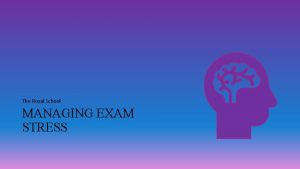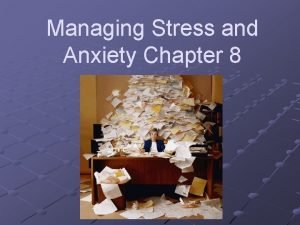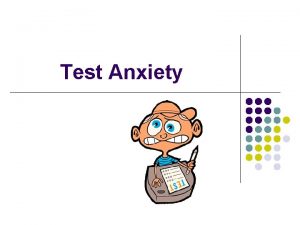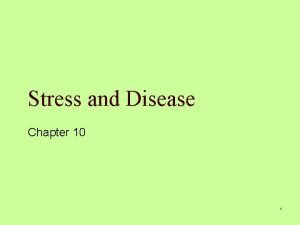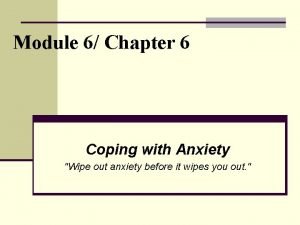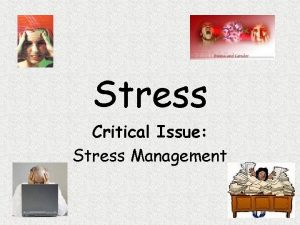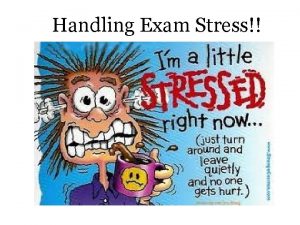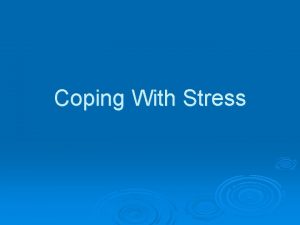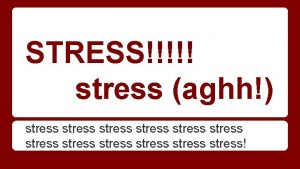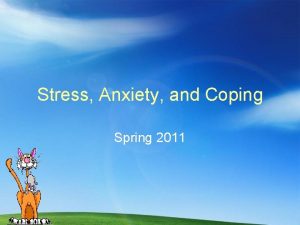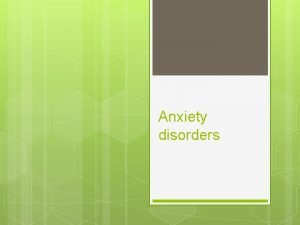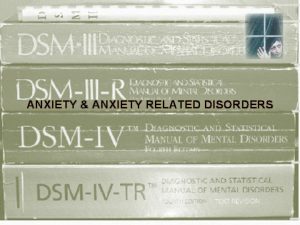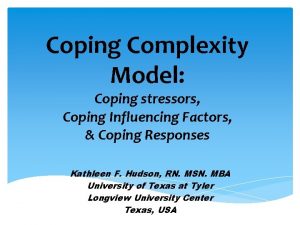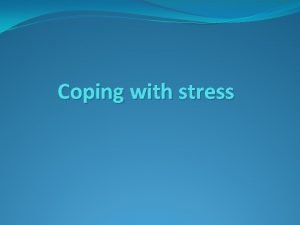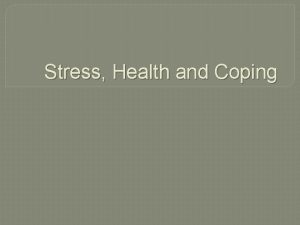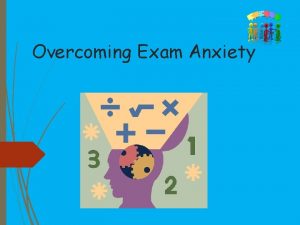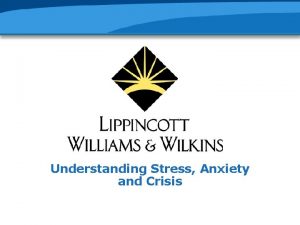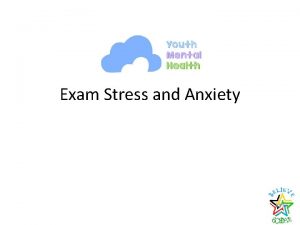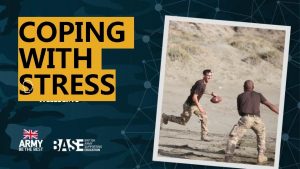Coping with exam anxiety What is anxiety stress





















- Slides: 21

Coping with exam anxiety

What is anxiety / stress? § A reaction to pressure or demands § Short-term exposure to pressure can be positive and helpful § Exposure to prolonged stress can be damaging § Stress is not a disease, but it can reduce the ability to study effectively and can have a very negative impact on wellbeing.

Stress. . • Is a natural adaptive response. Our body reacts automatically to prepare us for action • Known as the fight or flight response, adrenalin is pumped into our bloodstreams which triggers energetic, quick, acute reactions.

Fight or Flight Response • There are only a few situations in modern life when this system is useful • It helps us to survive immediate danger, but it can also have negative consequences. • It can cause increased heart rate • It can cause ruminating thoughts & can make it difficult to make decisions. • It can reduce our ability to study effectively or think clearly.

breathing rate increases blood flow to skeletal muscles increases heart rate increases STRESS HORMONES intestinal muscles relax pupils dilate blood sugar levels increase blood pressure in arteries increases


Exam related stress • • • All or nothing thinking Discounting the positive - only seeing the negative side Over-generalizing - ‘If it happened before it will happen again’ Believing a catastrophe will happen Emotional Reasoning - ‘If I feel it then it must be true’ Trying to please others Being a perfectionist Feeling under pressure to do everything right Setting impossible targets Repeated anxiety, stress, fear of failure The family/ historic context for success

What does exam stress look like? • Physical – headache, stomach upset, sweating, shortness of breath, increased heart rate • Cognitive – “freezing, ” confusion, self-defeating thoughts • Emotional – low self-esteem, depression, anger, hopelessness • Behavioral - Fidgeting, tapping, walking quickly

Taking Cognitive control • Prepare well - overlearn the material • Practice good time management • Space out studying • Avoid procrastination • Eliminate cramming • Use active study techniques • Review regularly, self test • In the exam scribble all information down you can think of • Answer the easy questions first • Test anxiety symptoms usually subside after 10 – 15 minutes

Taking emotional control • Emphasise choices – avoid being the victim • Acknowledge and accept where your child is emotionally • Encourage reflection on progress • Actively practice relaxation techniques • Use positive self-talk • Avoid thinking traps • Use visualisations • Help your child to identify their triggers and plan how you’ll cope with them

Thinking traps • Fortune telling - when we predict that things will turn out badly, but in reality, we cannot predict the future • Black and white thinking - when we only look at situations in terms of extremes: success or a failure. In reality, most events call for a more ‘moderate’ explanation. For example, missing one piece of homework does not mean you have failed the entire course • Over- generalisation - when we use words like ‘always’ or ‘never’ to describe situations or events. This type of thinking is not helpful because it does not take all situations into account. For example, sometimes we make mistakes, but we don’t always make mistakes. • Labelling - Sometimes we talk to ourselves in mean ways and use a single negative word to describe ourselves. This kind of thinking is unhelpful and unfair. We are too complex to be summed up in a single word. • Catastrophising - when we imagine that the worst possible thing is about to happen, and predict that we won’t be able to cope with the outcome. But, the imagined worst-case scenario usually never happens and even if it did, we are most likely able to cope with it.

The Power of Positive Self-Talk Am I falling into a thinking trap? What is the evidence that this thought is true? What would I tell a friend if he/she had the thought? Am I confusing possibility with probability? It may be possible but is it likely? Am I 100% sure that xxxxx will happen? Is xxxxxx really so important that my future depends on it? What is the worst that could happen? Is this a hassle or a horror? If it did happen, what can I do to cope or handle it?

Taking physical control • Exercise everyday - clears out the stress hormones! • Take time for hobbies and enjoyable activities • Practice relaxation techniques regularly • Do not allow cramming the night before tests • Ensure enough rest and appropriate nutrition • Set up a calm study environment

Relaxation techniques Breath Exercise 4 -7 -8 • Take a breath in for 4 counts through the nose quietly • Hold the breath for 7 counts • Breathe out for 8 counts loudly

Relaxation Response • The relaxation response is a good strategy to use when seated initially and during the reading time of an exam. • Sit in a chair • Grab the chair from underneath quietly and pulling the chair upwards while pushing your feet downwards for 5 secs. Relax for 10 secs. • Repeat 3 times.

Square breathing Use the exam paper as the sides of the square

Mindfulness • Feeling present in the moment can reduce worry and help your child to focus. • Mindfulness training equips students with the tools to help remain calm, sustain attention, and be able to focus. • Huge range available on internet, we recommend mindshift

Eat sleep and exercise • Eat well – eat a healthy balanced diet • Sleep well –plenty of good quality sleep 8 – 9 hours • Don’t allow revision or study in bedroom • Digital detox – go dark

Be kind • Encourage time for relaxation, whether that’s sport, a hobby, or just watching TV without a textbook or revision notes around • Encourage talk about worries – this will help keep things in perspective and to get thoughts in order.

On the day of the exam • Encourage an early start, provide breakfast and make sure everything was ready the night before • Have a positive conversation - encourage your child and remind them how proud of them you are already. • Walk to school • Don’t project your worries onto your child – be calm and patient – if things didn’t go well …. don’t dwell on it. Ask what they would have done differently and clarify if there is anything that needs to be done differently before the next exam.

 Coping strategies for exam stress
Coping strategies for exam stress Grief nursing diagnosis
Grief nursing diagnosis Chapter 4 lesson 2 managing stress answer key
Chapter 4 lesson 2 managing stress answer key Chapter 4 managing stress and coping with loss notes
Chapter 4 managing stress and coping with loss notes Chapter 4 managing stress and coping with loss
Chapter 4 managing stress and coping with loss Chapter 4 managing stress and coping with loss
Chapter 4 managing stress and coping with loss Stress strain coping support model
Stress strain coping support model Stress strain coping support model
Stress strain coping support model Stress management mcqs
Stress management mcqs Family stress and coping
Family stress and coping Stress appraisal and coping
Stress appraisal and coping Difference between anxiety and stress
Difference between anxiety and stress Chapter 8 managing stress and anxiety
Chapter 8 managing stress and anxiety Stress anxiety depression
Stress anxiety depression Exam anxiety symptoms
Exam anxiety symptoms True strain equation
True strain equation Define axial stress
Define axial stress Chapter 10 stress responses and stress management
Chapter 10 stress responses and stress management Coping mechanism
Coping mechanism Systematic desensitization worksheet
Systematic desensitization worksheet Problem-focused coping examples
Problem-focused coping examples Mental health jeopardy
Mental health jeopardy

